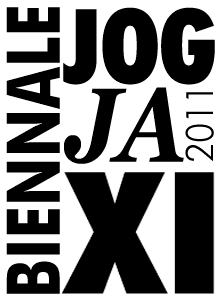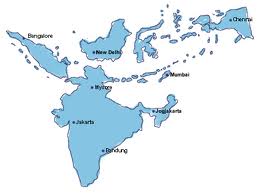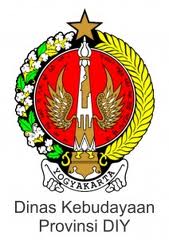Opening Ceremony of Biennale Jogja XI
November 30, 2011
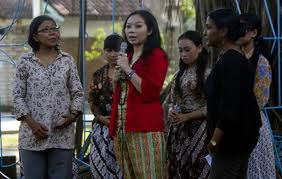
Yustina Neni (Director of Yogyakarta Biennale Fondation), Alia Swastika (Curator/Indonesia), Suman Gopinath (Co-curator/India) (Photo By Oblo)
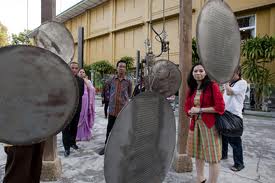
Governor of Yogyakarta Special Province Sri Sultan HB X and Cultural Attache of Indian Embassy Mr. Zahur Zaidi in The installation of Jompet Kuswidananto at the opening of Biennale Jogja XI 26 November 2011, at Jogja National Museum (Photo By Oblo)
Preview: 25 November 2011 | Opening: 26 November 2011
At:
Jogja National Museum, Jl. Gampingan no. 1, Yogyakarta
Taman Budaya, Jl. Sri Wedani no. 1, Yogyakarta
Biennale Jogja XI / Equator # 1, is the first in a series of five international biennales to take place in Yogyakarta, Indonesia. The geographical point of reference for these Biennales is countries that are located near the equator ( 23.27º north and south of it) and the series will see Indonesia’s cultural engagement with the participating countries. Shadow Lines, the first edition, will have forty artists from Indonesia and India collaborating in the exhibition that opens on 26 November 2011.
Shadow Lines suggests imaginary lines that draw people together and pull them apart; it also refers to geo-political borders and the creation of modern states in South Asia. Curated by Alia Swastika (Indonesia) and Suman Gopinath (India), the Biennale, with its overarching theme of ‘religiosity, spirituality and belief’ will attempt to present ways in which artists from the two countries address and interpret their contemporary conditions, informed by their personal experiences, as also by the political structures of the countries they live in.
Participating artists include:
Atul Dodiya, Archana Hande, Anita Dube, Amar Kanwar, N S Harsha, Prabhavati Meppayil, Sreshta Rit Premnath, Pushpamala N, Riyaz Komu, K.P Reji, Sheela Gowda, Shilpa Gupta, Sheba Chhachhi, Sakshi Gupta, Valsan Koorma Kolleri, Setu Legi, Krisna Murti, Jompet Kuswidananto, Arahmaiani, Wedhar Riyadi, Andy Dewantoro, Christine Ay Tjoe, Paul Kadarisman, Albert Yonathan, Akiq AW, Ariadhitya Pramuhendra, Iswanto Hartono, Wimo Ambala Bayang, Tromarama, Octora, Theresia Agustina, Titarubi, RE Hartanto, Nurdian Ichsan, Wiyoga Muhardanto, Erika Ernawan, Melati Suryodarmo, Arya Panjalu / Sara Nuytemans, Ruangrupa, Irwan Ahmett
Besides the main exhibition in two venues, there will be several parallel programmes and special projects like the Equator Festival with the contemporary reinvention of the Ramayana ballet, seminars, artists’ talks and community projects. For further information visit our website: www.biennalejogja.org

Why the Equator
The BJ will engage with countries from around the equatorial zone (spanning 23.27º north to 23.27º south of the equator) for the next 10 years. The equator is an extraordinarily fascinating area to explore –from geological, geographical, ecological, ethnographical, and historical, as well as political perspectives. It is a mosaic of islands, continents and oceans, and represents the ‘arena’ for studies, meetings, encounters, collisions, reparations and renewal. The geo-political division of north and south, the economic division of prosperity and poverty, and cultural perceptions of ethnic stereotypes have all contributed to the development of contemporary culture. Through our focus on the Equator, we envision something a bit different, with the hope that it will induce and nurture alternative relationships and networks while incorporating art in life.
In each cycle of the Biennale, from 2011 through 2022, BJ will work with and engage in face-to-face encounters with one nation from the equatorial region, beginning in South Asia and then moving west to the Middle East, Africa, Latin America, and the South Pacific islands. The equatorial zone embraces similarities throughout the region, however at the same time the equator is the line that strings together an amazing diversity of expressions. The equator will become the common thread to ‘re-read’ the world. While not ignoring the existence of the conventional centers, working in the space of the equatorial belt offers a perspective that is not centered, or non-centered. Biennale Jogja XI 2011 will start the journey this year via an encounter with India.
Focus of the two curators
India’s influence on Indonesian culture, particularly in Sumatra, Java, Bali, and amongst several ethnic groups in the eastern archipelago, has contributed greatly to pluralism in Indonesia. Although there are many similarities in Indian and Indonesian cultures, there are also many differences in the respective cultural contexts.
The theme of BJ XI “The Equator: An Indonesian and Indian Encounter” is religiosity and diversity, and will present ways in which artists from the two countries address and interpret their contemporary conditions, informed by their personal experiences, as also by the political structures of the countries they live in.
Throughout history, much of the interaction between these two countries has been through religion. Several of the religions that are currently practiced by Indonesians were brought to the islands by Indian traders or religious practitioners.
Later, with the establishment of religions as social institutions encompassing spiritual and cultural practices, differences in interpretation of religious texts reflect their roles in relationship to political powers or authorities.
Side event: The EQUATOR FESTIVAL
The Equator Festival is a city-wide event that invites the participation of the general community of Yogyakarta and the regencies in the Special Province of Yogyakarta (DIY). The artworks, which will be presented in a variety of forms, will focus on the theme of the Biennale Jogja XI, i.e., religiosity and diversity, and the indianese. To facilitate a different and broader distribution of creativity in society, in particular, in relation to how the role of creativity shapes Yogyakarta’s dynamics, whether artistic or cultural. The Equator Festival will validate the primary focus of the BJ XI and the direction of the BJ for the next ten years.
*New Interpretation of the Ramayana Ballet
The Ramayana Performance is one component of the Equator Festival. Yogyakarta’s rich treasury of extremely creative artists and community will gather to re-create the Ramayana Ballet, which has become one of the primary attractions in DIY. The new Ramayana presentation will be focused from the perspective of Lawa Kusya, a representative comparative text that is not currently as popular as the established versions of the Ramayana epic. As religions (and their institutions) always vie for the premier position, these alternative versions of the Ramayana also undergo a process of intense and impassioned negotiation. Visually, Lawa Kusya represents the defeated, unglamorous, unsuitable, and unseen; however it provides the audience with a broad venue for reflection.
*Parallel Events
The Parallel Events will be creative activities held throughout the province. They will confirm Yogyakarta’s position as a center of art in Southeast Asia. These activities will include exhibits and performances of theater, music and dance, and will involve art galleries, art spaces, institutes for social and cultural studies, universities, and art communities throughout DIY. These activities will focus on the issues of the equator, wealth and diversity, as well as differences and similarities between India and Indonesia.
*Conferences, Seminars, Artist Talks and Discussions
In the international art world, a biennale inevitably leads to the emergence of new ideas and forums for dialogue are necessary for the communication of these ideas. As an international event, BJ XI will design a number of forums that will involve important figures from the international art world.
*Workshops
Several Indian artists will conduct workshops in public spaces, both in the city of Yogyakarta as well as in the regencies, in schools and neighborhoods. Direct encounters between Indian artists and the Yogyakarta community will benefit both the artists and the community who will gain knowledge about each other as neighbors who embrace many cultural similarities.
*Award
The presentation of awards has become a proud tradition of every BJ since its founding in 1988. This year, 2011, will be no exception. The BJ XI will present Lifetime Achievement Awards to artists and important figures in the art world, and an award to the best designer of one of the Parallel Events.
*Apprenticeship and Volunteer Programs
BJ will be managed by a committee of professionals (YBY). However, as the success of the entire program cannot be achieved by the BJ committee alone, the committee will introduce programs for apprentices and volunteers that will be open to individuals from any profession, including retail workers, doctors, street vendors, students, taxi drivers, pedicab drivers, housewives, civil servants, etc. Hundreds of visionary volunteers and apprentices in every corner of DIY will help to support the success of BJ XI 2011. Their participation will represent the love of the Yogyakarta community for their home, showing that Yogyakarta is a friendly, comfortable and beautiful place to live and visit, for anyone from anywhere.
About the Biennale Jogja:
Since its inception in 1988, the Biennale Jogja (BJ) has become arguably the most ground-breaking art event in Indonesia and has been credited with bringing to the attention of a broad audience many of the country’s premier artists. Initiated by Taman Budaya Yogyakarta, a government arts and culture center, the Biennale evolved to become one of the most highly anticipated national art events. After years of fluctuating administration, an independent non-profit, Yayasan Biennale Yogyakarta (Yogyakarta Biennale Foundation) or YBY, was established on the 23rd of August 2010. Based on principles of professionalism, transparency and accountability, YBY will oversee the continued management of the Biennale Jogja while skillfully competing with other major biennales throughout the world.
Biennale Yogyakarta Foundation’s mission is: Initiate and facilitate efforts to achieve a strategic concept that contributes to art and cultural developments and to improve Yogyakarta as a cultural city, as a place for fair and democratic living.


